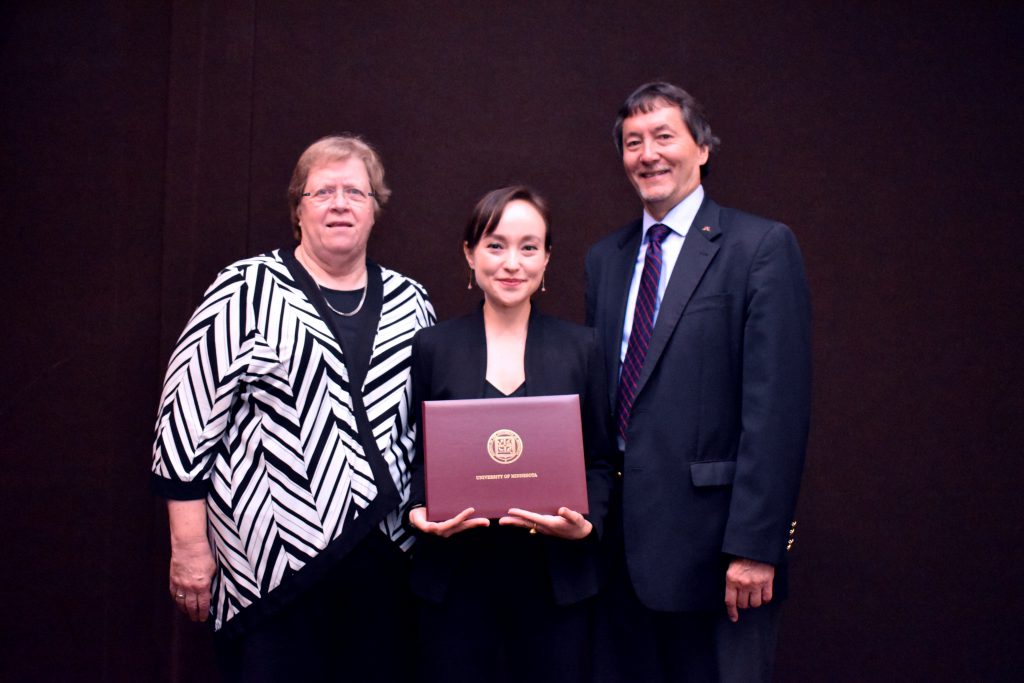
Photo: Julie Michener
Christina Zdawczyk, a PhD student in the Department of Educational Psychology’s psychological foundations of education program, was recently honored by the College of Education and Human Development (CEHD) Women’s Philanthropic Leadership Circle (WPLC) with a Graduate Student Award.
Zdawczyk—whose faculty adviser is associate professor Keisha Varma—accepted her award during a ceremony held at the University of Minnesota Alumni Center on June 11. At the event, she explained what drives her to “learn better ways to teach science” and gave a heartfelt thank you to the WPLC with the following remarks:
Hello everyone, and thank you so much for coming together today, in part to honor those of us who were selected to receive recognition by the Women’s Philanthropic Leadership Circle this year.
Ever since I was in first grade and a boy told me I can’t do math because I’m a girl, I’ve been compelled to prove every person who’s thought less of girls, wrong. This manifested in my summers at a summer program taking genetics and cryptology in male-dominated classrooms. It pushed me into leadership positions that—while uncomfortable at first—I grew into. And eventually, it fostered a greater sense of security regarding my own abilities, as well as a desire to turn around and help other girls who didn’t or don’t have the strong positive support systems that helped me along the way.
This is how I ended up at the U. Driven by a conversation with a precocious girl who was taking computer science at the same summer program I had attended 10 years prior (and where I worked as staff during summers as an undergraduate) and hearing her same sense of isolation and imposter syndrome that I had felt years before, I saw a responsibility to make sure that subsequent decades saw greater improvement than the years that separated us. No girl, no woman, should feel responsible for the stereotypes that threaten them and compel them to undermine their own intelligence or self-worth. My master’s research focused on strategies for creating computer science classes with environments that promote girls’ sense of belonging and interest, without deterring others. My current work as an NSF fellow at the Smithsonian Science Education Center focuses on scaffolding teachers’ understanding of how to create inclusive environments for students—including girls, English language learners, students with disabilities, and students of various races, ethnicities, and backgrounds. And my dissertation research is focusing on understanding how to help science teachers—many of those I’ve worked with who have been women—learn better ways to teach science.
It is this last endeavor that will be so largely supported by the WPLC graduate student award. With this award, I will be able to better strengthen my measures and understanding of science teacher conceptions and self-beliefs as they enter professional development, through repaying participating teachers for their time and help in piloting my surveys and helping me create rigorous scales for better measurement. These same teachers have tirelessly worked with us on other endeavors to test educative materials for us, and I’m so grateful for the opportunity to repay their kindness. This award will also allow me to include a qualitative component to my dissertation study, by granting me access to necessary programs to analyze these teachers’ open-ended responses to questions about their scientific understanding. Lastly, the remaining award money will help me in what will hopefully be my last year as a graduate student, at an essential time as my NSF fellowship funding comes to an end.
My whole life has been driven by a desire to push against the tide keeping girls and women out of STEM and STEM education; even now, as I try to continue to expand this scope from myself, to girls, to women, I’m still constantly filled with an immense sense of fraud and imposter syndrome myself. It was incredibly easy to feel as though I didn’t deserve this award and that I don’t belong among such accomplished graduate students. And the prospect of meeting all of you genuinely inspiring, strong, kind, philanthropic women and men was frightening, because I was worried you might discover my flaws.But a greater part of me knew that I was just reverting back to those hardwired insecurities—the ones keeping those girls, and those women, and yet again, myself, from pursing things I want and causing me to attribute this recognition to chance. As it says on the Women’s Philanthropic Leadership Circle website landing page, “Your life doesn’t get better by chance, it gets better by change.”
Thank you for inspiring me to reflect on my thoughts about chance, and for providing me with such change, not only through the funding to help both others and myself as I continue on with my graduate studies, but more importantly, for recognizing my history and my research. You have reminded me once again of these obstacles women face, even internally, even when being celebrated and recognized.
I cannot stress the significance and gratitude I feel of receiving this award from a women’s leadership group after years on this path. And I can’t think of a greater honor than to be recognized by the women and men who have supported and led the progress of women’s advancement. I’m humbled, and I cannot wait to reciprocate your kindness through continuing to try to change the lives of others.
Thank you.



